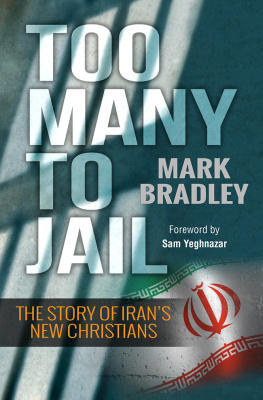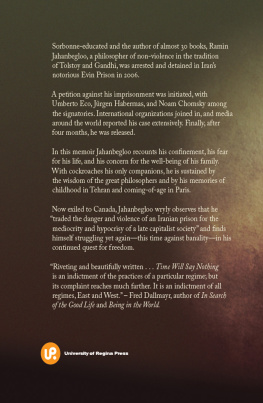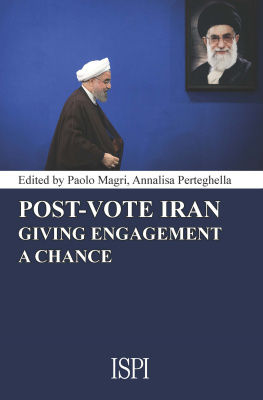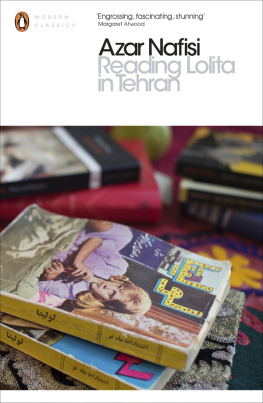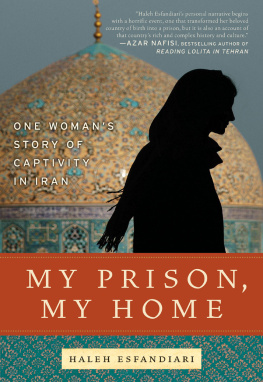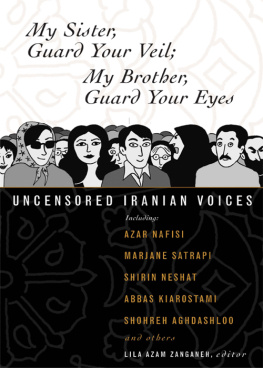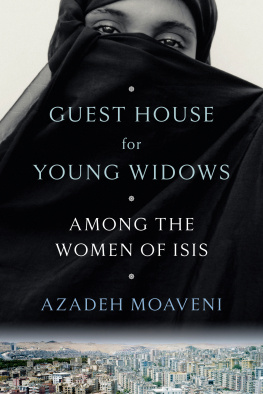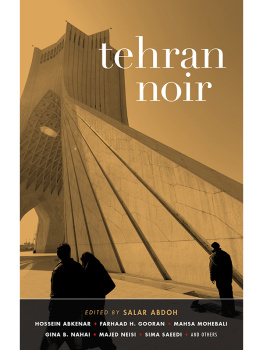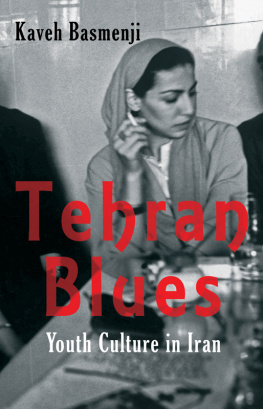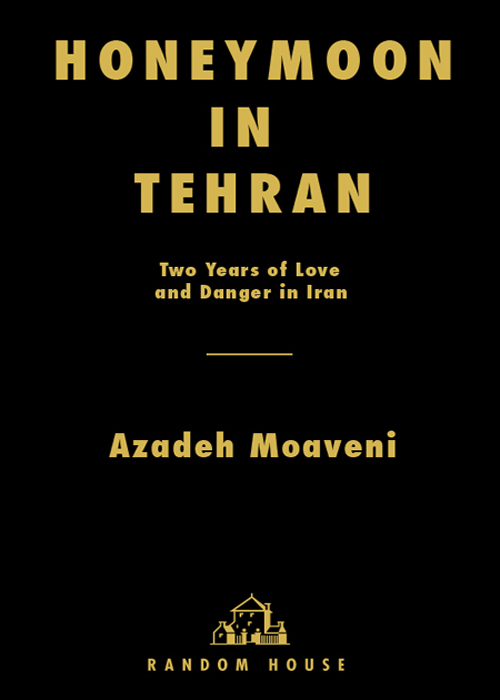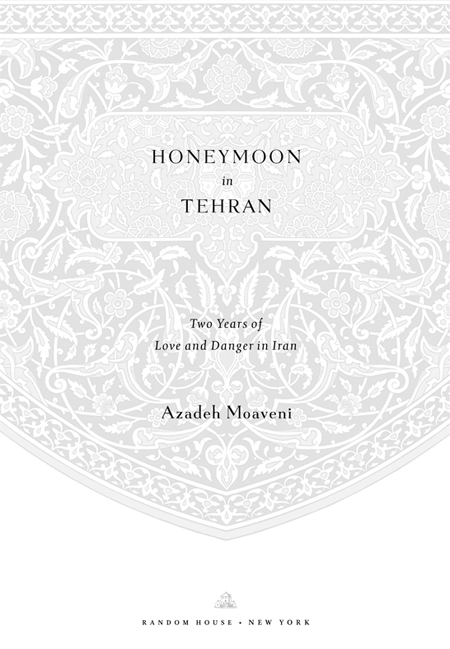Also by Azadeh Moaveni
Lipstick Jihad
Iran Awakening (with Shirin Ebadi)
Table of Contents
For Arash
Why cling to one life
till it is soiled and ragged?
The sun dies and dies
squandering a hundred lives
every instant
God has decreed life for you
and He will give
another and another and another.
Mowlana Jalaleddin Rumi
CHAPTER 1

Tell Them We Are Democrats
I n the late spring of 2005, I returned to Iran to report on the countrys presidential election. My career as a journalist for Time magazine had begun with an Iranian election in 2000, and though in the intervening years my reporting took me across the Middle East, it was in covering Iranian elections that I felt most at home. My real home, of course, was in northern California, where my parents still lived and where I had been born and raised, in a community of superlatively successful Iranian-Americansdoctors, lawyers, bankers, and venture capitalistsafflicted with migr nostalgia. I visited California occasionally to attend friends weddings, see my relatives, and fill a suitcase with Whole Foods products I could not find in Beirut, where I had lived since 2003. Situated on a glorious stretch of the Mediterranean, Lebanon for me was at the perfect geographic and existential distance from Iran. The proximity meant I could take a quick flight to Tehran for a few days of reporting, and then retreat to my calm, westernized life of Pilates classes and cocktail bars.
When I arrived in Tehran that spring, everyone in all my disparate worldsfrom California to Beirut to Tehransent e-mails asking me to keep them abreast of my reporting. This in itself was unusual, as Iranian politics and its conclaves of mullahs did not typically elicit interest. But even the outside world understood that the upcoming election was of enormous import: it would indicate whether a crucial land of seventy million sitting atop one of the worlds deepest oil reserves would ascend to the ranks of respectable nations, or would stay mired in the radicalism that had defined its past three decades.
As important as the election was, though, it was not my only reason for going back. My ulterior motive was to discover whether I could return at all. In the two years that had passed since my last visit, I had published a book about Iran that was, effectively, a portrait of how the mullahs had tyrannized Iranian society and given rise to a generation of rebellious young people desperate for change. Lipstick Jihad included depictions of drug-soaked underground parties, clerical hypocrisy, and the sort of criticism that had, in the mouths of other Iranians, led to prosecution and imprisonment. It was, in short, the sort of book that dictatorships never welcome and that one writes on the eve of permanent departure, a final, cathartic clanging of the door on the way out.
But being young and foolish, I had every intention of going back. I so desperately wanted Iran to be a place where you could speak truth to power that I decided to test reality. How wonderful it would be, I reasoned, if I could return unscathed. Then I could present myself back in the United States and say, See, you were wrong. Iran is not such a dictatorship, after all. Unlike Americas Arab allies, it tolerates criticism. And so I wrote breezy e-mails to friends saying things like If I dont emerge from the airport, you can have all my shoes, and boarded the plane to spend two weeks in Tehran.
The portraits of the dour ayatollahs that hung above the arrival hall were so familiar to me that I didnt even look up. With enough time, I had simply stopped seeing them, their beards blending into the yellowing walls. It seemed entirely normal for a capital city in the twenty-first century to be covered with oversize images of turbaned clerics. For the briefest second, before I handed my passport over to the yawning female clerk in black chador, the nonchalance my therapist would call denial faltered, and I felt a flash of dread.
Ms. Moaveni. She peered down at my passport. This is highly irregular.
I said nothing. Perhaps I would be interrogated. Or maybe they would just confiscate my passport, a form of soft hostage taking. I began to feel nervous about what might happen to me, and about how foolish I would seem for having invited it.
The stamp marking your last exit from Mehrabad is so light it is unreadable. In the future, please check and ask the passport official to use a fresh ink pad, if necessary.
I breathed in relief, and thanked her warmly. From there, it took scant minutes to collect my suitcase and sail through customs. This in itself signaled how much Iran had changed since the late 1990s. In previous years, the process of extricating oneself from Mehrabad airport had been a trauma in itself. When I visited Iran for the first time as an adult in 1998, customs officials roughly pried apart layers of my luggage. They triumphantly held up a dry academic book of Middle Eastern history and told me it could not enter the country without being vetted by official censors. They levied an outrageous sum of duty on a phone I had brought as a gift for my aunt, and left me to hastily repack the contents of my suitcase, struggling to keep bras and other such intimate belongings out of sight. By the time I reached the point where I would be inspected for proper Islamic dressa headscarf that suitably covered my hair, long sleeves, and a coat that reached my kneesI was a sweaty, enraged mess eager to reboard the first plane to the civilized world.
But this time, I found Iran treated its returning citizens with less arbitrary abuse than ever before. Mehrabad bustled with crowds of excited relatives greeting their kin, the acrid smell of sweat mingling with the perfume of giant bouquets. In the past six years, Iranians living abroad had begun returning in significant numbers for the first time since the 1979 revolution. The homecomings overwhelmed the modest capacity of Mehrabad, built in the late 1940s, and on nights like this, everyone ended up pressed up against everyone else, an intimate, jostling throng in which men and women embraced and veils slipped off entirely.
I reminded myself to e-mail my father later and describe to him how comfortably I had made it through the airport. Like many Iranian residents of the United States, my parents traveled to Iran infrequently and had little sense of how much had changed in the past six years. They came to the United States in the late 1960s to attend university, back when the Iranian government was closely allied with Washington and believed it needed a generation of western-trained professionals to modernize the nation. They returned to Tehran with their American degrees, got married, and went about applying their expertise until the mid-1970s, when they followed my grandmother to California, intending to keep her company for a few short years while she received cardiac treatment at Stanford.
The revolution of 1979 dashed any hopes of return to Iran, and my family ended up, along with the great influx of Iranians who fled on the eve of the uprising, as immigrants to America. For years they did not visit Iran, save one short trip when I was five, and I grew up with the migr childs ambivalent yearning for homeland. I encountered the real Iran only as a young adult, when I visited in 1998 during a Fulbright year in Cairo. During that brief trip, I discovered the fascinating debates over Islam and democracy that were under way in Iran, and concluded the country had more to offer than just pistachios and Islamic militancy. I packed up and moved there in 2000, to report for


